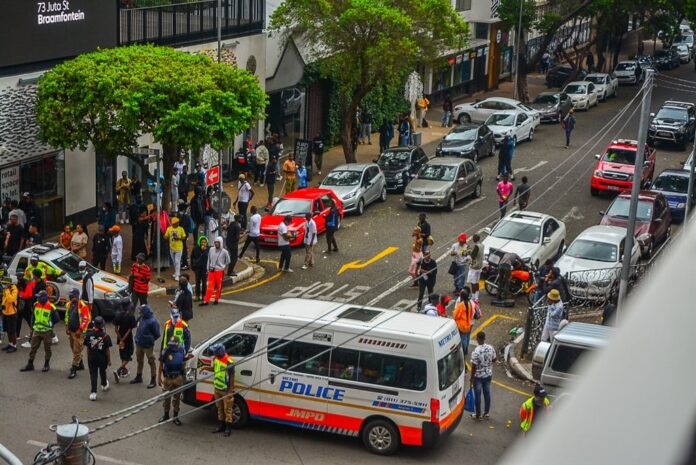The city of Johannesburg, a bustling metropolis often lauded for its resilience and spirit, is grappling with a chilling reality: the murder of a dedicated forensic investigator, Zenzele Benedict Sithole, a man who dared to shine a light on the dark underbelly of corruption within the Johannesburg Metropolitan Police Department (JMPD). His death, a stark reminder of the dangers faced by those who challenge the entrenched systems of power, has left a city in mourning and a nation questioning the very foundations of justice.
Sithole, a seasoned investigator with a reputation for unwavering integrity, was a member of the City's Group Forensics and Investigation Services (GFIS), a unit tasked with rooting out fraud, corruption, and maladministration within the police department. His investigation, tragically cut short, focused on a "guns for hire" syndicate operating within the JMPD, a network allegedly supplying firearms to criminals for illicit activities, including cash-in-transit heists.
"It was definitely a hit," revealed an insider, speaking on condition of anonymity, their voice laced with a chilling certainty. "They wanted him dead because he was going to expose them. They were hiring out metro guns to criminals to commit heists and got money in return."
The source painted a picture of a brazen operation, where JMPD officers, entrusted with upholding the law, were instead facilitating criminal activity, turning a blind eye to the consequences of their actions. The syndicate's reach, according to the insider, extended to a senior superintendent, whose name is known to City Press, who had filed an internal complaint after suspecting that metro guns and ammunition were being used for criminal activities. This brave officer, who dared to challenge the corrupt system, was subsequently removed from her post in the city centre and relocated to another office in Sandton, a move that raised eyebrows and fuelled suspicions of a cover-up.
"This woman was training officers at a shooting range on Sundays," the source revealed. "However, she became suspicious when more guns were booked out over weekends and that was when she filed a complaint."
The alleged modus operandi of the syndicate was as chilling as it was audacious. R5 rifles and ammunition were booked out and stored in a safe place in Randburg, accessible to criminals who would then use the weapons for their nefarious activities, returning them to the safe along with their ill-gotten gains. The sheer audacity of this operation, the blatant disregard for law and order, speaks volumes about the level of corruption that has permeated the JMPD.
"There are a lot of people involved in this syndicate," the informant stated, their voice heavy with the weight of the truth. "Unfortunately, Sithole paid with his life. He knew what was happening and was about to expose those involved. That's why he was taken out so quickly."
Sithole, a man known for his courage and commitment to justice, was described as an "extremely brave top investigator" who did not shy away from risky assignments. His dedication to uncovering the truth, his unwavering pursuit of justice, ultimately cost him his life. His death is a tragic reminder of the dangers faced by those who dare to challenge the corrupt systems that have taken root in our society.
The GFIS, the unit in which Sithole served, has been a thorn in the side of some politicians, including city manager Floyd Brink, who was implicated in wrongdoing during the approval of a R320 million public safety contract. The city's failure to follow proper procurement procedures in awarding this contract raised serious concerns about transparency and accountability. Despite the allegations, the Johannesburg city council voted to dismiss charges against Brink in September last year.
The GFIS, a unit established during the Mashaba era with a mandate to combat corruption, has been the target of numerous attempts to dismantle it, with some politicians dismissing it as a tool of the Democratic Alliance (DA) to target their opponents.
Sithole's death comes shortly after his marriage in March, leaving behind five children and a grieving widow who lives in fear for her own safety. She suspects that she may be the next target of her husband's killers, a chilling fear that underscores the pervasive nature of the threat.
"She's scared that those who killed him might think she knows too much and try to silence her as well," said a family spokesperson, expressing the deep-seated fear that has gripped the family. "She doesn't feel safe at all."
The spokesperson, who also fears for his own life due to his close relationship with Sithole, drew parallels between this incident and the murder of Babita Deokaran, a whistleblower who was assassinated in 2021. He urged the authorities to take concrete steps to protect whistleblowers, highlighting the chilling reality that criminals are operating with impunity, eliminating those who dare to expose their illicit activities.
"If we aren't careful, all the whistleblowers will be wiped out and people will be afraid to expose corruption," he warned. "Criminals have taken over our country and are brazen in how they eliminate people."
The murder of Zenzele Benedict Sithole is not just a personal tragedy; it is a national crisis. It is a stark reminder of the deep-rooted corruption that has infiltrated our institutions, the dangers faced by those who dare to challenge it, and the urgent need for systemic change. The fight for justice, for transparency, for accountability, must continue. The memory of Sithole, a man who gave his life in pursuit of these ideals, must serve as a beacon, guiding us towards a future where corruption is eradicated and justice prevails.

Follow Us on Twitter










